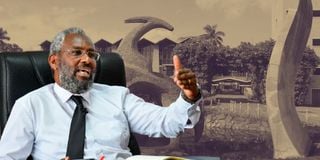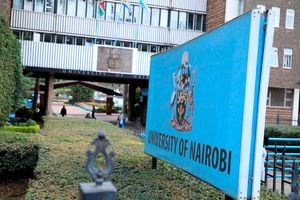
Prof Stephen Kiama, the former Vice-Chancellor of the University of Nairobi.
The University of Nairobi (UoN) faces a leadership crisis, with 24 key managerial positions – including Vice-Chancellor (VC), Deputy DVCs, and directors of critical departments like Finance and Human Resources – in an acting capacity.
The university has been embroiled in internal disputes, particularly regarding the handling of staff matters and governance. VC successions have become sticky.
The preponderance of acting appointments, according to the UoN Council has persisted since reforms that started in 2021, leaving the institution in an administrative limbo.
In an October 14, 2024 letter, UoN Council Chairman Amukowa Anangwe announced the termination of VC Stephen Kiama’s services, effective September 27, following the suspension of the latter on August 3, 2024.
Prof Margaret Jesang Hutchinson was named Acting VC, transitioning from her role as Deputy VC Research, Innovation and Enterprise.
Prof Ayub Gitau, formerly the Dean of the Faculty of Engineering, assumed the position of Acting Deputy VC Academic Affairs.
The role of Chief Operations Officer (COO), established during the 2021 governance reforms, is held by Mr Brian Ouma, also in acting capacity.
Mr Ouma’s appointment has been contentious, with the Ethics and Anti-Corruption Commission (EACC) raising questions on the legitimacy of his academic papers.
Prof Anangwe describes the situation as “historical,” attributing it to structural changes initiated by the previous council.
The changes involved abolishing some positions, creating new ones and leaving many roles substantively unfilled.
“When we assumed office in May 2023, we found this scenario. Some individuals had been acting in their roles for more than two years, far exceeding the six-month limit allowed by law,” Prof Anangwe says.
According to the UoN Council chairman, the university’s leadership structure is crumbling under the weight of indecision and court battles.
“In December 2023, the University Council resolved to advertise 24 positions, many of them arising out of previously acting appointments. Some people had acted for more than 23 months,” Prof Anangwe says.
He adds that efforts to end the problem have been hindered by legal battles, with court injunctions stalling competitive recruitment initiated by the council in December 2023.
“We advertised the positions, but the process was stopped by court action, instigated by individuals in acting roles who feared losing to more qualified candidates,” Prof Anangwe says.
The council has since developed a human resource instrument to align with Public Service Commission (PSC) guidelines and address court concerns.
However, Prof Anangwe says the approval of this policy has been lengthy, further delaying recruitment.
According to Prof Anangwe, having many individuals in positions in acting capacity is not unique to the UoN “but reflects broader organisational challenges, including financial constraints and a lack of succession planning”.
“Succession remains a challenge at various levels, including faculties and departments. Financial constraints and the moratorium on hiring have also delayed efforts to address these critical gaps,” he says.
Meanwhile, students and employees – including lecturers – suffer the consequences of a rudderless administration, with key decisions delayed and accountability missing.
Bureaucracy has also played a role in these leadership challenges at Kenya’s premier institution of higher learning.
Prof Anangwe says the new HR policy cannot move because of endless approvals, leaving the council powerless.
“We are ready to advertise and fill these vacancies, but legal and procedural hurdles keep holding us back,” he says.
The absence of permanent officers in critical positions has many implications.
Acting officials may lack the authority or confidence to make long-term decisions, which could hinder the strategic programmes of the university.
Key roles like COO, being occupied on interim, may lead to compromised financial oversight and accountability, increasing the risk of inefficiencies, experts say.
In a statement on December 3, 2024, the university council said it has encountered governance and operational challenges due to transitional leadership roles.
“Transitional leadership roles in key management positions have presented governance and operational challenges. Recruitment is ongoing as part of broader governance reforms,” read the statement.
According to Auditor-General. Nancy Gathungu, several public universities are on the brink of collapse due to inability to meet important financial obligations.
The institutions named in the report include Nairobi, Kenyatta, Moi, Rongo, Maseno, Garissa, Egerton, Taita Taveta and Kabianga.
“The university has outstanding financial obligations amounting to Sh12.8 billion. While efforts are underway to address these liabilities, the constraints in operational funding remain a pressing concern, impacting the institution’s financial stability and ability to meet its obligations,” the UoN Council statement went on.
Senators waded into the never-ending wrangles on December 9, 2024, calling for urgent investigations into management issues plaguing the institution.
Apart from management, senators named other problems bedevilling the university.
These include arbitrary transfers of employees, undue placement of staff on compulsory leave, scrapping of lawful positions and creating non- existent posts.
The lawmakers then gave the University Council a week to resolve what they described as a governance crisis that has disrupted operations and learning.
National Assembly Education Committee chairman, Julius Melly, criticised the UoN Council for what he said is unpreparedness and failure to address critical concerns.
According to Melly, the institution is being managed through an illegal structure that does not align with the Universities Act or its statutes.
The committee highlighted several issues, including prolonged acting appointments, which contravene HR policies limiting such roles to six months.
“Several members raised concerns regarding the organisational structure of the university, which is said to be in violation of the law,” Mr Melly said.
“The Universities Academic Staff Union has challenged this illegal framework in court, requesting HR manuals and explanations from the UoN Council. The council failed to provide these important documents, prompting us to suspend the meeting and demand compliance within one week.”









